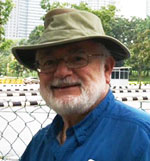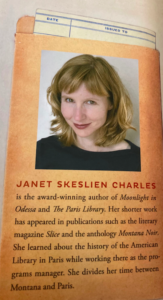The Paris Library, A Novel, by Janet Skeslien Charles; Atria Books 2020; 9781982-134198; 355 pages; $28.00.

By Oliver B. Pollak
LAGUNA HILLS, California – World War II is a magnet for fiction and non-fiction books about books, bookstores and libraries. The current zoom book talk circuit includes The Paris Library, A Novel by Janet Skeslien Charles (June 2020) and the non-fiction Information Hunters, When Librarians, Soldiers, and Spies Banded together in World War II Europe by Kathy Peiss (December 2019, with the month of publication representing a COVID-19 time marker). The Guernsey Literary & Potato Peel Pie Society by Mary Ann Shaffer and Annie Barrows, a sadly delightful story, appeared in print in 2007 and on the screen in 2018.
The bookplate of the American Library in Paris established after the Great War proclaimed, “After the darkness of War, the light of books.” The library celebrated its centenary in 2020. The Paris Library is an engaging historical novel, a treat for bibliophiles, which imaginatively addresses the American Library under the duress of the German occupation of Paris.
The narrative has two voices. There is Odile Souchet, a young ambitious and adventuresome French woman, smitten with English literature. She memorized the Dewey Decimal System devised by Melvil Dewey in 1876. (The Library of Congress classification scheme was invented in 1897). Odile peppers her speech categorizing life, situations and people by the appropriate Dewey system of three digits and a decimal. Her love of literature and her librarian ambitions are fortified by her mentor Irene Cohen, a Sorbonne Professor. Odile gets a job at the American Library in 1939.
Odile is worried about the failing health of her mother, Maman or Hortense, and her police officer father taking a mistress. She distresses about the fate of her twin brother Remy who became a German prisoner of war. She met Buck Gustafson, a Montanan in the American Hospital in France. Forty years later Odile Gustafson, a war bride and now widow is living in Froid, Montana, a village of about 220, where everyone seems to be Catholic. The distance to the closest library is not disclosed. To add to the melancholy, Odile and Buck’s only son died in the American War in Vietnam.
The second voice is Lily, a teenager who lives next door to Odile in Froid. Lily’s mother Brenda died of heart disease and she is beset by the awkwardness of her father remarrying Eleanor only 10 years older than Lily, and quickly having two children. Lily is treated as a nanny, au pair and food preparer as her neglectful local banker father works 12-hour days six days a week, just when Lily needs a father the most to navigate an awkward temperamental teenagerhood. Lily turns to neighbor Odile for advice, comfort, and French lessons.

The serious heart of the novel is the role of Dorothy Mae Reeder (1902-1957), a Library of Congress employee who directed the American Library from 1936-1941 and how the library continued to function during the occupation despite German interference including searching for Jewish and foreign subscribers, British and American expatriates, and confiscating banned books. In fiction the library secretly delivers books to house-bound Jewish subscribers.
The author lists the burdens and jeopardy of Jews in occupied France; wearing a Yellow Star, sitting in last car of the Metro, not being allowed to use phone booths, teach, enter parks, or cross the Champs-Elysees.
The German occupation “Library Protector,” Dr. Fuchs, informs library directors of the parameters under which libraries can operate and survive. These instructions included no service to Jews. Unbeknownst to Odile her police officer father and her police officer lover are complicit in following orders, rounding up Jews whose fate is to silently disappear in Drancy, the German incarceration, deportation and transit camp in a northeastern suburb of Paris.
The author worked in 2010 as the American Library Programs Manager. A last pleasant aspect of this book is its dust jacket. The inside back of the dust jacket depicts the traditional and ubiquitous Brodart or Demco library due date card. Dear readers, if any of you have books using such cards as artwork on the book covers, please share the image with me by email.
*
Oliver B. Pollak, a professor emeritus of history at the University of Nebraska Omaha, and a lawyer, is a correspondent now based in Richmond, California. He has written books and articles about libraries including “Nebraska’s Libraries at War, 1917-1919,” Nebraska History (Fall 2006): 119-32.